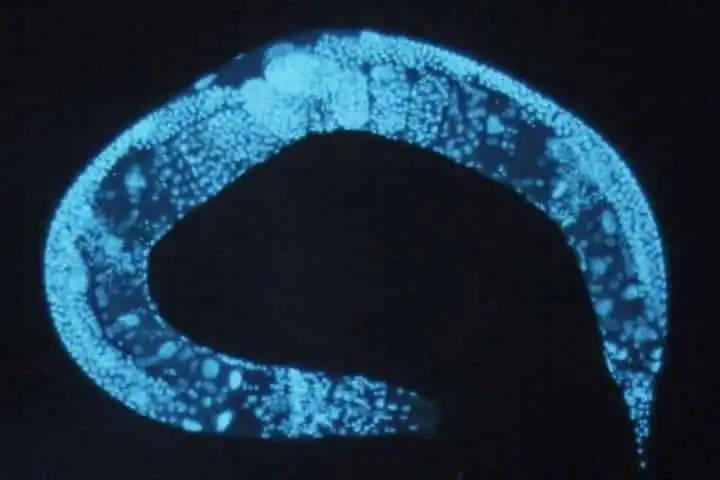

Researchers revived two of the worms by simply rehydrating them with water (Representational image)
<p>
<strong>Nature is amazing as scientists discover every now and then. A latest study done by the University of Michigan Life Sciences Institute (MLSI) has found that a roundworm species, used on a large scale for biological research can sense and also respond to sound.</strong></p>
<p>
The study examining the genetic mechanism that underlies the sense of hearing, as per sciencedaily.com was to be published in the journal Neuron.</p>
<p>
MLSI&rsquo;s lab of Shawn Xu have been using roundworms or Caenorhabditis elegans to study sensory biology for more than 15 years. At the beginning, it was thought that these worms have only three main senses. These were touch, smell and taste.</p>
<p>
Now the laboratory over the years has concluded that worms have the ability to sense light without having no eyes and also the ability to sense their own body posture during movement. The latter is called the sense of proprioception.</p>
<p>
Xu, MLSI Research Professor and senior author of the study remarked: <a href="https://www.sciencedaily.com/releases/2021/09/210922121812.htm">&quot;There was just one more primary sense</a> missing — auditory sensation, or hearing. But hearing is unlike other senses, which are found widely across other animal phyla. It&#39;s really only been discovered in vertebrates and some arthropods. And the vast majority of invertebrate species are thus believed to be sound insensitive.&quot;</p>
<p>
The researchers found that the worms react to sounds which are airborne and that too in the range of 100 hertz to 5 kilohertz. This range is broader than what some vertebrates can sense.</p>
<p>
Reacting to this tone range, the worms were seen to respond fast, moving away from the source of the sound. This showed that not only were the creatures able to hear but also knew the direction from where the sound was coming.</p>
<p>
<strong>Also read: <a href="https://www.indianarrative.com/science-news/school-going-kids-discover-giant-penguin-fossil-in-new-zealand-115700.html">School going kids Discover Giant Penguin Fossil in New Zealand</a></strong></p>
<p>
Several experiments were conducted to make certain that worms were reacting to airborne sound waves and not vibrations of the surface on which they were resting.</p>
<p>
Xu thinks that worms are able to sense these tones by making their entire body act as a cochlea — the spiralled, fluid-filled cavity in the inner ear of vertebrates.</p>
<p>
The skin of the worms have two types of auditory sensory neurons. These are connected tightly to its skin and so when the sound waves strike the skin, they shake it which in turn causes the fluid inside the worm to tremble. This is a copy of the way fluid vibrates in a cochlea. The auditory neurons bound to the skin are activated through these trembling, which in turn translate them into nerve impulses.</p>
<p>
Localised in varied parts of the worm&rsquo;s body, the two neuron types help it to determine the source of the sound which activate the neurons. According to the experts this may be helping the worms to locate their predators &ndash; many of whom make audible sounds while hunting &ndash; and thus avoid them.</p>
<p>
The study opens up the possibility of looking at other earless beings like ringworms, such as flatworms, earthworms and molluscs, who too may have the ability to sense sound.</p>
<p>
<strong>Also read: <a href="https://www.indianarrative.com/science-news/birds-can-pick-early-warning-signals-of-tsunamis-storms-and-hurricanes-113704.html">Birds Can Pick Early Warning Signals Of Tsunamis, Storms and Hurricanes</a></strong></p>
<p>
Xu, who also happens to be a Professor of molecular and integrative physiology at the U-M Medical School, stated: &quot;Our study shows that we cannot just assume that organisms that lack ears cannot sense sound.&rdquo;</p>
<p>
Even though there are some similarities between the auditory system of the worms and vertebrates, what this new study does is highlight some vital differences.</p>
<p>
Elaborating on this Xu said: &quot;Based on these differences, which exist down to the molecular level, we believe the sense of hearing has probably evolved independently, multiple times across different animal phyla. We knew that hearing looks very different between vertebrates and arthropods.&rdquo;</p>
<p>
The senior author added: &quot;Now, with C. elegans, we have found yet another different pathway for this sensory function, indicating convergent evolution. This stands in sharp contrast to the evolution of vision, which, as proposed by Charles Darwin, occurred quite early and probably only once with a common ancestor.&quot;</p>
<p>
Following the study of the worm&rsquo;s major senses, the researchers now want to delve into the genetic mechanisms and neurobiology that drive these sensations.</p>
<p>
Xu averred: &quot;This opens a whole new field for studying auditory sensation, and mechanosensation as a whole. With this new addition of auditory sensation, we have now fully established that all primary senses are found in C. elegans, making them an exceptional model system for studying sensory biology.&quot;</p>
Germany has come out resolutely behind India and its fight against terrorism under Operation Sindoor.…
Baloch leader Mehran Marri has accused Pakistan of unlawfully occupying Balochistan since 1948, transforming the…
The Trump administration announced on Wednesday that it will continue its efforts to prevent advanced…
External Affairs Minister S Jaishankar met with German Chancellor Friedrich Merz in Berlin on Friday…
The Central Tibetan Administration (CTA) launched a Month-long Panchen Lama Awareness Program aimed at educating…
India's Ambassador to Russia, Vinay Kumar, on Friday, briefed the all-party parliamentary delegation, led by…